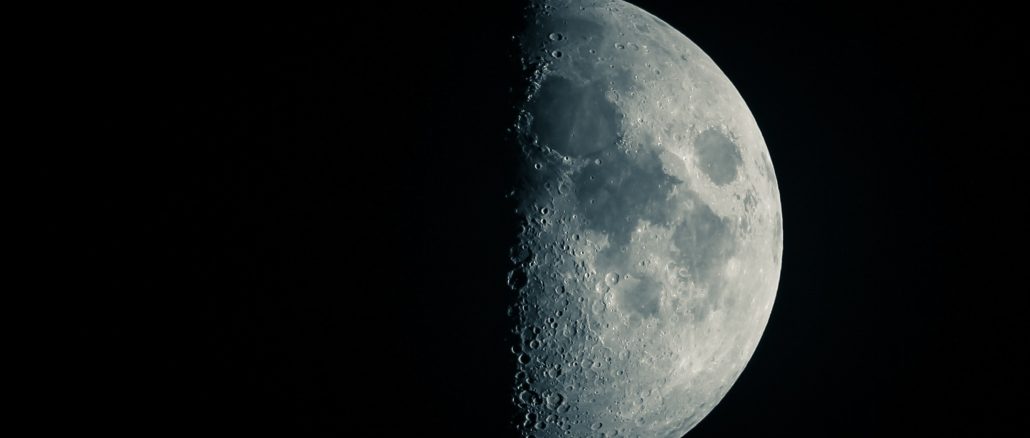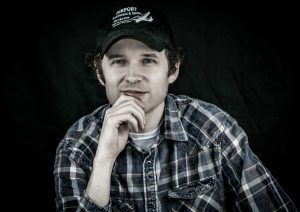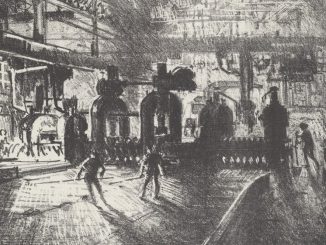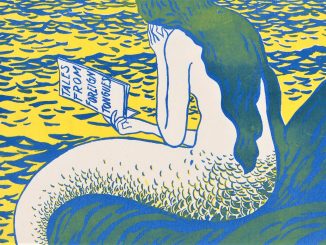
“Hepato-poetics: A Brief Polemic Against the Moon and Heart” is part memoir and part reading journal. It is also my attempt to highlight poetry that deals with the liver, as opposed to the more frequently-used and anatomically-erroneous symbol “heart.” Through poets like Robert Lowell, Ted Hughes, Mary Ruefle, and Kaveh Akbar, I attempt to trace the regenerative symbolic possibilities of the liver while exploring the role poetry has played in shaping my own family dynamics.
My father’s father was John Calvin Freeman, but everyone called him JC. My given name is the ponderous and ridiculous John Calvin Freeman III. I’d argue that post-Lowell each poet is veering toward a confession bathetic in its content and articulation, so I publish under Lowell’s nickname and a variation of my middle name: “Cal.”
The existence of the John Freeman who authored the book, Maps, and edits the popular website Lithub compelled me to change my name, or at least when I’m writing poems. This has led to occasional absurd confusion at readings and conferences. An editor who has published my work will address me as “Cal” and it will be a long awkward minute before I realize she is talking to me. Or a fellow writer at a reading will ask if I go by John or Cal and how did I come about that pseudonym.
About the heart, that John Freeman writes, “The heart is not a diamond pressed down / into something hard like rock, but, rather, the word / my father’s father said to himself / those too-cold California nights when / all he could see was the work ahead of him, / the dead behind.”
*
My grandfather was a butcher. My dad became a professor. My mother always wrote poetry, none of it very good, but she can bring even a bad poem to life with her haunting recitations, and she has a near-photographic memory.
As a child in West Detroit, I’d listen to her recite Eugene Field, Alfred Noyse, and Rudyard Kipling poems off of our big green front porch into the night.
*
Sitting in the open doorway of my neighbor’s garage the other night, drinking a beer and discussing his late mother, a union steward for the Ford cafeteria workers and a mean old woman, I realized he was looking up into the night sky as he addressed her, “Love you, mom!” She’d suffered quietly for years, and by the time she went to the doctor it was too late for anything but palliatives. Lung cancer, metastasis. Blood-flecked Kleenex hidden in the garbage can on the far side of her bed.
One way to look at a family is as a nexus of encrypted pathologies. One way to look at the deceased is as combusted light just now reaching us, stars, in other words. It’s a mnemonic that allows us to address what has left the world of matter but not the world of sight.
*
Donald Revell, in his most recent book, writes, “The moon has seen enough. Of gullies, / Of loose dogs and walking bicycles, / Enough. Let everything fly. Let all / Angels become angels of themselves.” The moon has seen enough and one need look no further for evidence of our doom than this over-reliance on the mercy of dispassionate celestial bodies. The epiphany seems to be in the sentence and prosodic acoustics rather than the sense. One could argue that it’s antithetical to the great purpose of poetry to look for sense, at least in the prosaic, syllogistic manner, but isn’t it a little embarrassing to ask us to gasp when finishing a line? What purpose can a tautology like “Let all / Angels become angels of themselves” serve us? In the poem, “Half a Century Gone,” Robert Lowell argues “The invincible / syllogism advances from talon to talon; / no earthly ripple disturbs the ballbearing / utility of the bald and nearest planet.”
*
My father never afforded himself such wistful remembrances of the flawed and bitter man who helped to raise him. In fact he hardly spoke of his father at all. My grandmother got sick of JC’s drinking and sent him packing for his native Tulsa, Oklahoma two years before I was born. Grandma Bette worked at Truan’s Candies on Ford Road scooping nonpareils and heart-shaped toffees for the doomed marriages of Dearborn Heights, Michigan.
Over beers I could sometimes get my dad’s brother Todd to tell me about my grandfather.
*
Uncle Todd fell from a stepladder while stocking shelves at Meijer in 1973. He was 22 at the time. He had been at the hospital the night before with a splitting headache. The doctors told his wife that he was drunk, to take him home. He hadn’t had anything to drink that day. The headache must have been unbearable.
I picture him downing aspirin on an empty stomach before work that morning and driving to Woodhaven in the rain, the windshield smearing beneath the wipers, Elvis Presley playing on the eight track.
The blood vessel balloons as Uncle Todd lifts boxes into top stock. At 11:30 AM the hemorrhaging begins. They call this a “dissecting artery,” which doesn’t make geometrical sense to me. I imagine a water balloon stretched around a spigot filling and bursting, but I know this isn’t right either.
After his release from the hospital, my uncle’s wife drove him to my grandmother’s door and left him. “They were young,” was all my father ever said about that.
*
In defense of lunar poetry, Mary Ruefle writes:
I am convinced that the first lyric poem was written at night, and that the moon was witness to the event and that the event was witness to the moon. For me, the moon has always been the very embodiment of lyric poetry. In the West, lyric poetry begins with a woman on an island in the seventh or sixth century BC, and I say now: lyric poetry begins with a woman on an island on a moonlit night, when the moon is nearing full or just the other side of it, or on the dot.
Here the moon is an active force, a reflector of light that imbues the poet with vision. It functions like a lamp rather than the stone-deaf ear of a lesser god or neighbor planet.
*
I’ve written about Warrendale before, that Polish working-class neighborhood in West Detroit where my mother subsisted on popcorn and Coca-Cola and spoke bad poetry into the night.
Strange for a pale Irish-American ghost like her to latch onto the words of an unabashed British imperialist like Rudyard Kipling, but I imagine she encountered him in school and never got that music out of her head. If you can keep your head when all about you / are losing theirs and blaming it on you… If you can fill the unforgiving minute / with sixty seconds’ worth of distance run, / Yours is the earth and everything that’s in it / And—which is more—you’ll be a Man, my son.
I’ve never been, nor has my mother been a man. Nor my father.
*
A maudlin and slothful person has written that some afternoons the poet’s only job is to listen to the rain, though this doesn’t sound like anybody’s idea of a job, and the rain won’t renew the tissue of the scarred organ.
Some afternoons the poet’s central task is to sick up at the thought of the Promethean quality of myth (I’m paraphrasing Adrienne Rich).
In these conceptions a poet has a furred tongue and thinly-concealed halitosis. Uselessness is not a crime, however, and much of the beauty we find in poetry has no real utility.
*
Dating back to the Hesiod the liver has been a source of fascination and awe for poets. This reverence involves its prolific ability to regenerate dead cells, as well as its ability to purge us of the filth we’ve ingested. An eagle gorged upon Prometheus’ liver each day while he was staked to a rocky bluff in punishment for stealing fire, yet the regeneration was relentless. The eagle could not consume it beyond its will to repair itself. Our literature is cluttered with anatomically-incorrect metaphors involving “heart,” but the liver is the only organ to offer a daily allegory about failure and renewal.
In his book, Of Silence and Song, Dan Beachy-Quick offers this gem: “Sometimes I think we carry within ourselves an aleph somewhere behind our heart, or is it within the liver, purging noise as blood is purged of its stain. I guess I don’t know. A transplanted spiritual organ given to us on loan. But I don’t know the terms of the agreement.”
The terms of the agreement say that the slow cirrhotic way we live and write is vain. If twentieth century hepato-poetics have taught us anything, it’s that, as John Berryman is purported to have declared at the end of one of his infamous benders, “We are unregenerate.” We are walking in and out of silence, but mostly towards it, and the liver regenerates dead cells the poem itself has killed until the scarred tissue of the prosody manifests.
*
When Kipling died, Orwell remembered him simply as “a jingo imperialist.” But the last word on Kipling would seem to belong to the students at Manchester University who, when in 2018 the poem “If” was displayed by the university on a pillar in their student union, whited it out and wrote over it with a Maya Angelou piece they felt better represented their diverse student body. One student, Sara Khan, accurately labeled Kipling a “racist” and viewed the Angelou poem as a “reclamation of history by those who have been oppressed by the likes of Kipling for so many centuries.”
*
The palimpsestic whiting out of the Anglo-Saxon purveyor of faux-wisdom strikes me as wonderful. The stories families tell themselves about themselves often function like palimpsests, but instead of dialectically defacing and unmasking the patriarch, they seek to recuperate him in dishonest, euphemistic ways.
I was told, for instance, that my grandfather had died of an abdominal aneurysm caused by a genetic disorder called “Marfan’s Syndrome.” This was a concoction of my mother’s. She is a nurse and thus has an ability to speak in highly-technical, convincing clinical terms. Through her cataloguing of the aneurysms on my father’s side of the family she was able to erroneously convince my sister and me that we also suffered from Marfan’s and were in danger of having dissections of our own.
I learned from my Uncle Todd that my grandfather actually died of a cirrhotic hemorrhage brought on by drinking. To hear Todd tell it, JC would wake up at four AM every morning, even if he didn’t need to work. On non-work days, especially during periods when he was laid-off, he’d drink Maxwell House coffee until eight AM and then send my uncle to the corner store for a fifth of Seven Star Whiskey. He’d polish off that bottle by two o’clock, take a nap, and be back up at four PM, by which time he’d send my uncle out for a second bottle that he’d work on through the dinner hour. Todd told me JC also smoked between two and three packs of Marlboro Reds a day. JC was 64 when he died and, given the way he lived, I’d call that a long life.
(Incidentally, recent hepatological research has shown that the scarring of a diseased liver is not a failure of the liver at all but, rather, a palimpsestic encryption of the failures of the heart.)
*
Ted Hughes’ vulture in Prometheus on His Crag is more common and more menacing than the eagle we typically encounter in conjunction with this myth. At one point early in Hughes’ sequence the vulture addresses the punished hero: “Today is a fresh start / torn up by its roots / as I tear the liver from your body.”
That bird, that / Filthy-gleeful emissary and / The hieroglyph he makes of my entrails // is all he tells. The impaled titan body is carrion to be consumed by a carrion bird, and what does this fact suggest about our dignity? Prometheus On His Crag // Began to admire the vulture / It knew what it was doing // It went on doing it / Swallowing not only his liver / But managing also to digest its guilt. Because carrion simply offers itself up to taste and mastication without the entanglements that accompany the lofty concept, the guilt is digested and, we’re led to believe, Prometheus is divested of his guilt.
“But what alcoholic does not speak guilt with a cirrhotic tongue?” my grandfather asks, living, as all the dead do, on Tulsa time.
*
In one of his lyric reflections on the deleterious effects of alcoholism, Kaveh Akbar writes, “Maybe it’s that forward seems too chronological, / the way the future-perfect always sounds so cavalier / when someone tells me some day this will all have been worth it.” And in another poem: “The body happens / and we consequence up.” To “consequence up” sounds like to sick up, but sick is not always a consequence, or at least not only a consequence. Akbar echoes Lowell when he argues, “The real world doesn’t care / about our spiritual conditions, / just asks that we be well / enough to smile at its clamor.”
To sick up is consequential in its eventuality, though, and the terms of the agreement forbid the world from convincing us otherwise.
When I will have smiled at its clamor the world will say it didn’t ask, that it compelled nothing. This is one of the great powers of a planet that amounts to water and stone and is habitable by mere fluke.

CAL FREEMAN was born and raised in Detroit, MI. He is the author of the books Brother Of Leaving and Fight Songs. His writing has appeared in many journals including New Orleans Review, Passages North, The Journal, Commonweal, Drunken Boat, and The Poetry Review. He is a recipient of The Devine Poetry Fellowship (judged by Terrance Hayes) and winner of Passages North’s Neutrino Prize; he has also been nominated for multiple Pushcart Prizes in both poetry and creative nonfiction. He regularly reviews collections of poetry for the radio program “Stateside” on Michigan Public Radio and serves as music editor for The Museum of Americana: A Literary Review.


